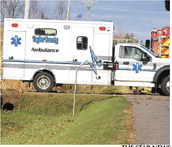County efforts to expand internet move forward
Construction could begin in spring
By this time next year residents in rural Taylor County could have access to affordable high speed internet.
That was the message from supervisor Mike Bub, chair of the county’s broadband committee, giving board members an update on the project at the Sept. 30 county board meeting.
According to Bub, by working with the fiber network company WANRack, based in Lenexa, Kan., the county could see construction work on the middle mile network beginning next spring with customers having access to it by as early as next fall.
Under the deal, the county would help cover some of the construction cost and then agree to lease a portion of the fiber lines. The county and the company would then lease access to the middle mile network to internet service providers as well as major users such as the schools and libraries. The revenue from these agreements would go to offset the county’s lease and pay the debt service on the county’s portion of the construction expenses. By working with schools, the county would be able to tap into federal e-rate dollars which will help defray the cost.
Bub said the county’s goal all along has been to get affordable high speed internet to residents. He noted that under the current proposal of working with WANRack, the county would have a turn-key operation with WANRack responsible for the ongoing upkeep of the fiber network.
The network proposed for the county would utilize a combination of buried fiber optic cable and microwave relay towers to provide a network backbone. Bub noted the relay towers are used for areas where it is not practical or too expensive to put in the buried line. He said the fiber optic cables cost about $90,000 a mile to install.
According to Bub, the county is in a request for proposals (RFP) period after which they will look at entering formal agreement with WANRack or other business partner and move ahead with construction in spring 2021.
Highway shop
County board members approved purchasing land in the village of Rib Lake for a new highway shop building to replace the current location.
While the vote to purchase the land was unanimous, supervisor Rollie Thums raised concern about plans to put it directly on CTH D, suggesting that setting it back further could open up developable properties along the road corridor.
“I don’t know that anyone wants to have a salt or brine shed in their front yard,” Thums said. The owner of the property was amendable to either selling the county the road frontage or a set-back parcel.
According to highway commissioner Ben Stanfley, there is a natural gas pipeline in the parcel that they have to work around. He said they are working with the village to deal with the setback from the village well. He said the plan would be to leave a screen of trees at the site between the buildings and CTH D. He said he would prefer to access directly onto the county highway rather than onto the local side road.
Supervisor Lester Lewis raised concerns about the cost of extending utilities from the road if the county decided to go further back on the property.
In other business supervisors, _ Approved a pair of funding requests for power line impact fees. The first was $15,000 for the restoration of the pond in the village of Stetsonville. Muskrats have undermined the bank causing the banks to collapse. The plan is to reestablish the banks, install rock, a pier and replace trees. The second request was also for $15,000 but board members only approved contributing $7,500 toward repairs at the community shelter owned by the Centennial Community Center. The shelter is used for gatherings and events and was in need of extensive repairs. Supervisor Ray Soper proposed reducing the county’s contribution noting that the structure is owned by the towns of Little Black, Deer Creek and village of Stetsonville and he felt those municipalities should be involved with the cost of the work. “I think providing $7,500 is more than generous,” he said.
_ Approved a resolution opposing the relocation of problem wolves to Taylor County. In the past, the state would trap and relocate wolves that had become a nuisance and while that practice is not as common as in the past, the county wanted to go on record opposing having wolves from elsewhere brought here.
_ Approved a resolution regarding the closure of the Verso Mill in Wisconsin Rapids and the concern about the impact it may have on timber sales in the county.
_ Approved a statement that Taylor County is not planning to pursue comprehensive county-wide zoning at this time. “I don’t think there is any political will to do countywide comprehensive zoning,” said supervisor Lester Lewis. The county board action was needed to clear the way for the town of Hammel to proceed with its local town zoning efforts. Hammel will join the towns of Grover and Little Black in having town-wide zoning.



